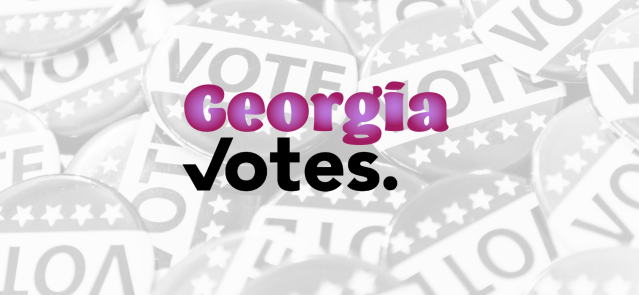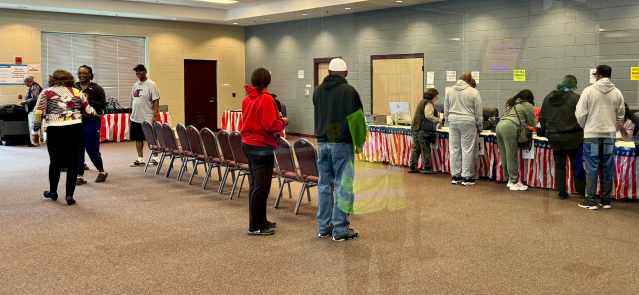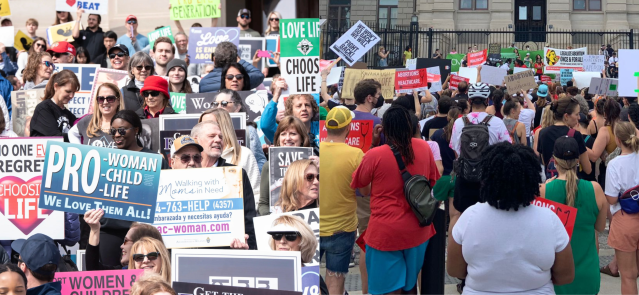Stay ahead of the curve as a political insider with deep policy analysis, daily briefings and policy-shaping tools.
Request a DemoHOAs can be ‘hellish’ for homeowners. Can Georgia lawmakers help?
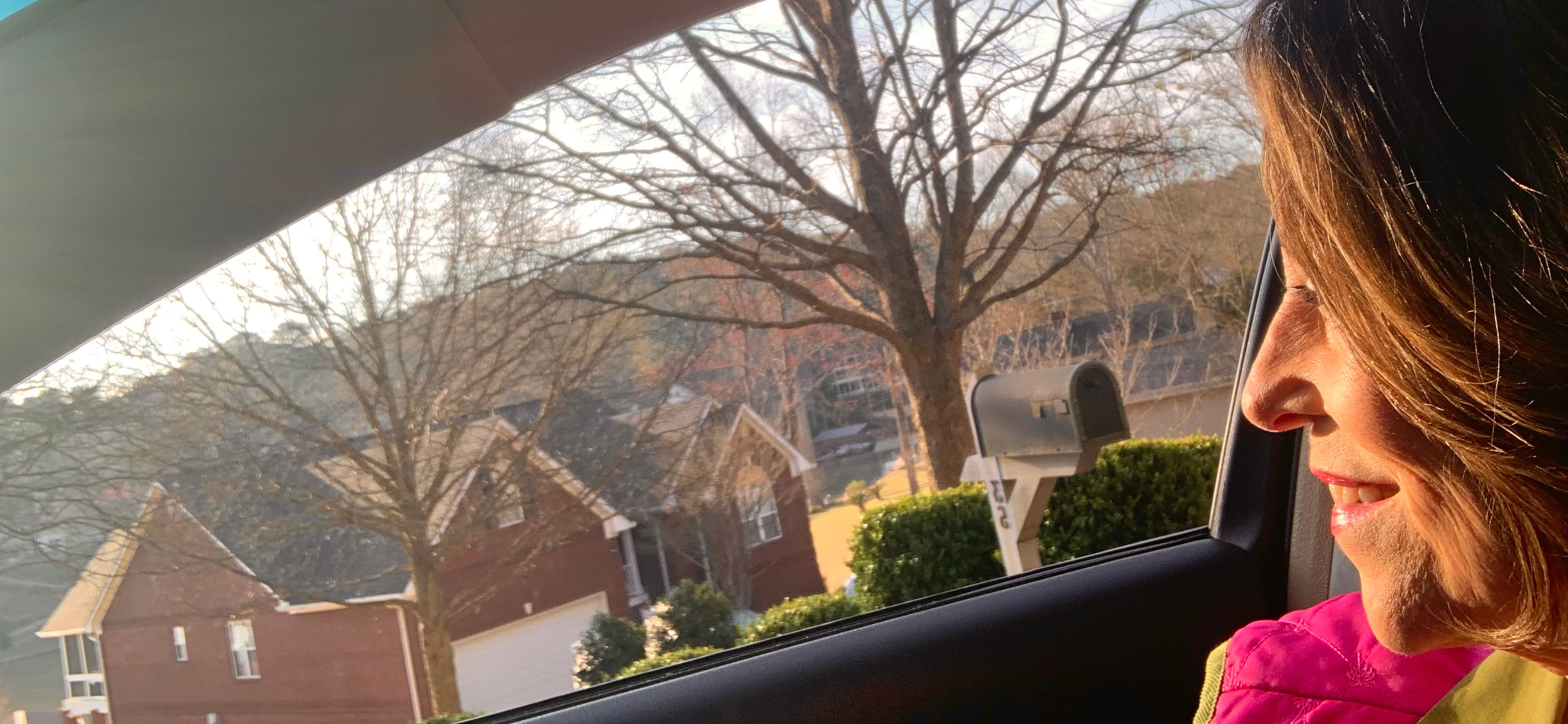
Bonnie Bell making inspections at one of 4 HOA properties she manages. (Credit: Bonnie Bell)
Editor’s note: This story is part of a series on community-governed associations such as homeowner associations, commonly known as HOAs. This article focuses on challenges HOAs and other community governed-associations face. Read the previous article.
More than 2.3 million Georgians live in communities run by associations that govern everything from the upkeep of the subdivision swimming pool and common grounds to the color of a person’s house, the length of their grass and how long their garbage container can stay out after it’s been dumped. That’s 2 in 10 Peach State residents whose abodes are governed by the proverbial noisy neighbor.
Over 90% of the new homes, condos and townhomes being built in the state are part of community-governed associations which, under Georgia law, have a lot of legal leeway.
The associations, commonly known as homeowner associations or property owner associations, are run by your neighbors who in some cases ultimately have more control over what happens to your home than you do. Fall behind on your dues — even if you’ve never missed a mortgage payment, and you’re likely to see what power they wield.
Stories abound about people who’ve run afoul of their HOA and end up drowning in penalties and assessments. Or they’ve lost their homes, which they may own outright, because they fell behind on their HOA dues or they didn’t understand the fineprint of the homeowners association covenant or other important documents.
The problem is more prevalent in condo communities where dues tend to be higher than subdivisions because condo dwellers may be paying for concierge services, according to Atlanta attorney Seth Weissman, a 30-year HOA specialist and senior partner at Weissman PC.
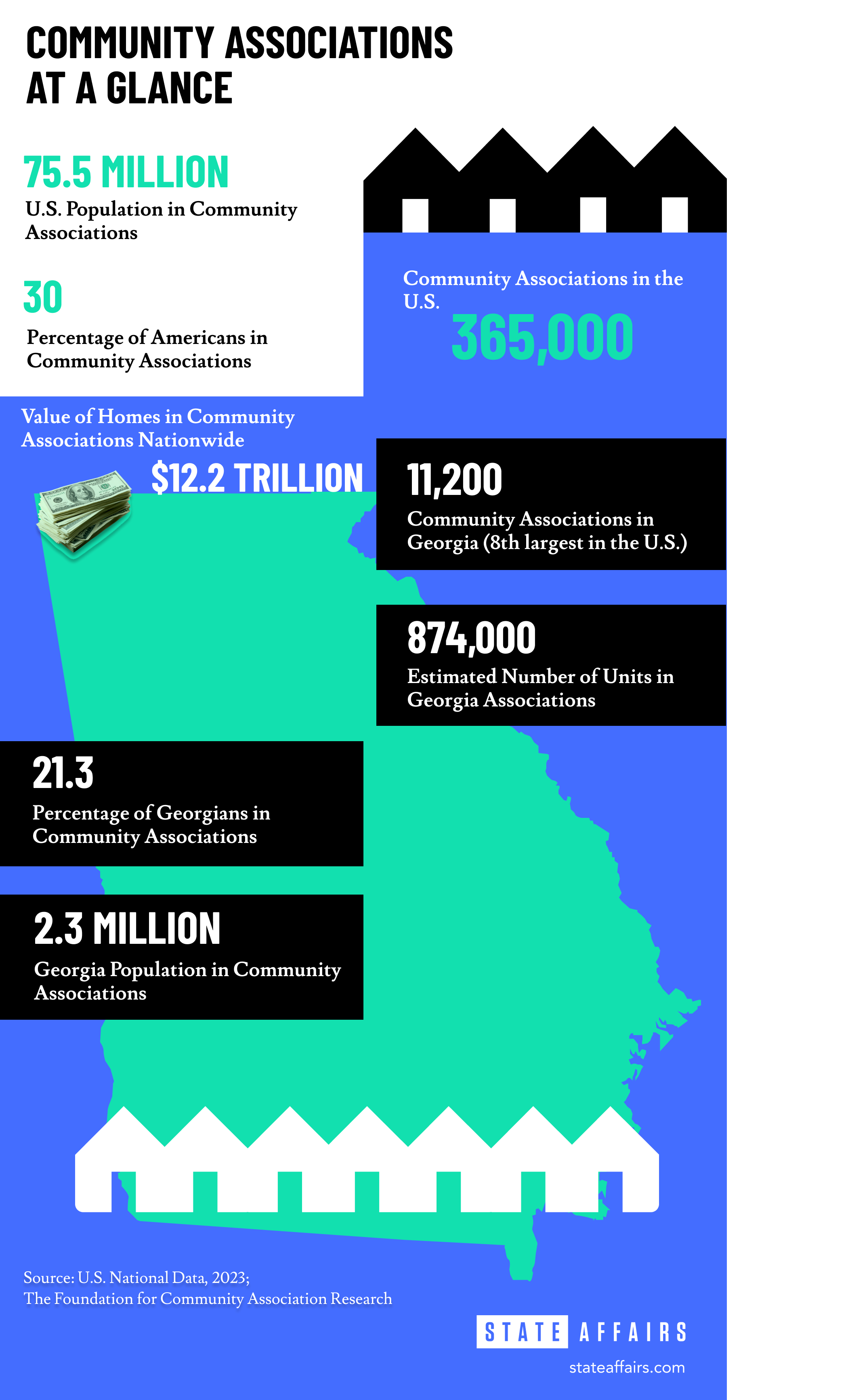
A state issue? Perhaps
Homeowner associations cropped up in the U.S. in the mid-1800s. Their numbers were small during the first 100 years but they began increasing in the 1960s after the Federal Housing Administration encouraged large-scale development in suburban areas of the country.
Developers began creating communities with amenities such as swimming pools and clubhouses and soon realized someone was going to have to maintain those amenities. Mandatory memberships in the communities were created to handle those responsibilities.. Along with offering amenities, some HOA covenants had a history of excluding people based on race, religion and national origin. The Fair Housing Act of 1968 was created to stop that.
Today, HOAs have deep pockets and can afford lawyers, making it difficult for individual homeowners to fight them without significant financial resources, experts say.
Legislation that would have addressed some HOA issues failed to make the cut last week during the Georgia General Assembly’s Crossover Day, when bills must move from the originating chamber to the other chamber in order to have a chance at becoming law. One such bill, sponsored by Sen. Donzella James, D-Atlanta, would have created an ombudsman position to mediate disputes between homeowners and their HOAs.
“I’m not sure having an ombudsman or a mediator would do a whole lot,” Weissman told State Affairs. “Will it help ensure that reasonable people act reasonably? Of course. Will it make an unreasonable person who’s on the [HOA] board act more reasonably? I doubt it. Is it going to make a violator who breaks all the rules suddenly start complying with the rules? No.”
Undeterred, Rep. Sandra Scott, D-Rex, announced Tuesday she will reintroduce a package of housing-related bills during the 2025 legislative session, including House Bill 1032, the Property Owners Rights and Accountability Act. The bill would repeal certain provisions related to liens on condominiums and lots concerning property association fees and assessments. It would provide a short title, make conforming changes and ensure property owner rights are upheld.
State Affairs reached out to the Georgia Chapter of the Community Association Institute which declined to be interviewed but instead preferred to issue a statement. State Affairs had not received the statement by press time.
‘Great and horrible’
Life under an HOA can be hellish — for homeowners and Homeowners Associations.
One Lawrenceville resident who serves on his HOA board and who declined to be identified for fear of legal retribution recalled the time a newcomer moved into the community, tore out their bathroom and buried the bathtub, toilet and plumbing in the front yard. The HOA had to go to court to get the homeowner to remove the debris. The homeowner left the community within a year.
Then, there was the time a restaurant owner bought a home in a community of single-family homes and turned it into a dormitory for his employees. The owner eventually sold the property after the HOA took him to court.
“The reason HOAs are great and horrible is more a function of the quality of people running it and their personalities and character,” said Weissman. “If you have a board that acts very reasonably and uniformly and fairly, I think everything works well. If you have the same group on the board year after year, if they are bullies, if they are nitpickers and they’re enforcing everything to the strictest letter of the law, I think they can become abusive. It’s really a function of who gets elected.”
Georgia associations are governed by a board of directors initially appointed by the declarant, usually the developer of the subdivision, and then elected by homeowners following the association’s declaration of covenants (“declaration”). The board, in turn, appoints officers to carry out the board’s duties and powers. The associations are financed by dues paid collectively by the homeowners.
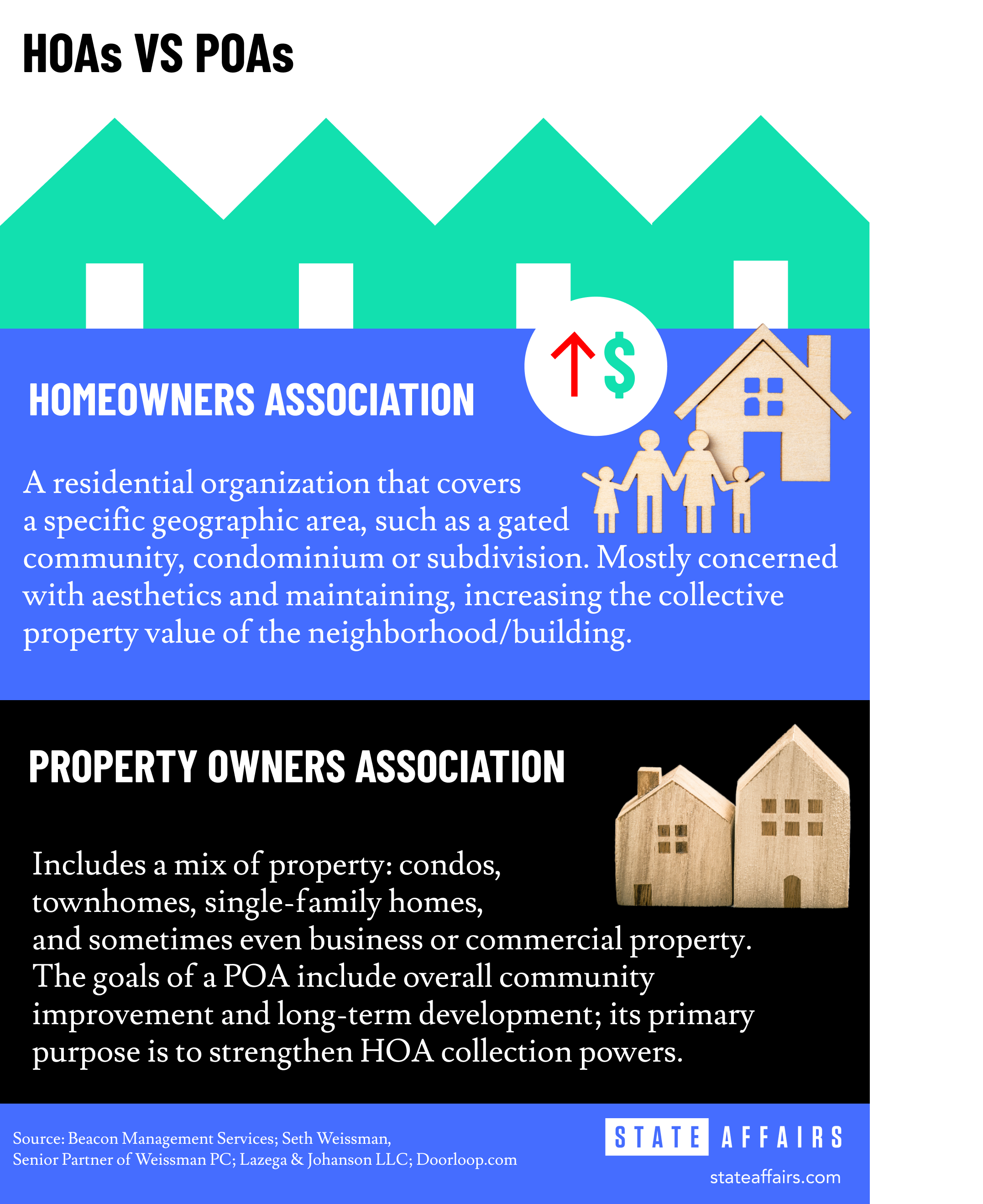
The tale of Bonnie Bell
For Bonnie Bell, overseeing communities with HOAs is a cross between being in a television reality show and a soap opera.
“You have a constellation of a lot of different personalities, with just the board of directors,” Bell, who manages HOAs at four Henry County properties, told State Affairs. “They are really individual personalities as an association property.”
Over half of the homes at one property, for instance, are rentals. “That’s another nightmare in itself because I know some owners are not on site,” said Bell, a broker with Beacon Management Services, Georgia’s fifth largest community association management firm, overseeing more than 37,000 units statewide.
Another is “a very hands-on property that has been well-maintained by the board,” Bell said. “Great leadership on that board. Several of them have been there for several years. They have a full understanding [of what needs to be done].”
The third is a 2-year-old townhome community that wasn’t well-maintained because the HOA leadership really didn’t understand their position, Bell said. “So I’m trying to educate them along with helping them act out their leadership roles for the association. So they’re learning as we go. Then I have to say, ‘Here’s why we’re going to do this and then I’ll take a paragraph from the association covenants or bylaws and send it to them so that they’ll understand I’m not doing this off the top of my head.”
The fourth HOA is a community where they “never get a quorum. Their board of directors stay the same year after year after year. The ones that are there feel very empowered. And if I can take a picture of a garbage can, even if it’s behind a car, [they want] a violation written and so that empowerment there, kind of lets you know that it’s definitely a stricter, black-and-white kind of [HOA]. They’re not as quick to respond to me though. I have to chase them [when] I need an approval.”
Bell is part inspector, detective, peacemaker and enforcer.
Last month, she had to put pressure on the management company of a homeowner’s rental property where a squatter had taken up residence. It wasn’t until Bell threatened to take action to evict the squatter and charge the owner’s account for it that the problem was resolved.
“All of a sudden, they were out there, and they got them out,” Bell said.
Last week, she spent a day at one subdivision sending violation notices from her cell phone to homeowners for trash can violations as she drove around the property.
During that outing, “a gentleman stopped me and then a car came up and blocked me from moving. And so the gentleman flagged me down and I rolled the window down and he said, ‘Are you lost?’ And I said, ‘No, sir. I’m your HOA manager, and I’m here doing inspections.’ He said, ‘Oh, we’ve been watching you.’ And I said ‘Well, that’s good because you need to be aware of what’s going on in your community.’ ”
Knowing the rules
While many homeowners may be adept at the comings and goings in their neighborhood, many aren’t as familiar with the various HOA rules they live under and that’s a big problem for the homeowner associations.
“The excitement at the closing table is to get your home and the keys,” Bell said. “They [also] sign a document at the closing table saying that they are aware of the [HOA] documents. They have read them. They understand them and they will abide by them. Unfortunately because of that excitement, they never remember that document. So when they move in and all of a sudden they have a fence around their house and a basketball goal in their driveway. They’ve violated the covenants because they did not get approval for that and this community does not allow basketball goals in driveways.”
Both Weissman and Bell say homeowners’ unfamiliarity with the details of their HOA documents is a big problem.
“They really don’t understand that they have these documents in place that govern the HOA,” said Bell, who suspects 80% of homeowners have never fully read their HOA documents. “And those documents are recorded so that you know they’re legal. They will hold up in court and they do have to abide by them.”
Weissman said a law requiring HOAs to keep complete and accurate sets of legal documents on hand or online for a nominal fee would help.
“That would make buying and selling homes much easier than it is at the present time,” he said.
Meanwhile, Bell has seen it all working with HOAs. And she catches it from all sides. She’s heard the horror stories of people being booted from their homes for not paying HOA dues.
But it all boils down to adhering to the covenants and laws, she said.
“The concern I have with the people that are running to the government to help them with an issue they have, is usually part of this is because they’re not abiding by the covenants. They just want someone to agree with them and get the association, quote, unquote off their back,” she said.
“You owe the assessment regardless. If you can’t pay it, let us work a payment program for you. Or some [homeowners] that I have are just ignoring it altogether and they’ve been turned over to collections. With that, that agency or attorney tries very hard to help them understand that the payment is necessary, [even] if they will not communicate or cooperate,” Bell added. “A judgment can be claimed and then a lien placed on the property. So the lien, whatever the amount is, can be satisfied at any time. If it isn’t, and it goes to sale, then the closing attorney has the responsibility of satisfying that lien before that house can close again.”
Living in communities with HOAs or other community-governed associations isn’t for everyone.
“Sometimes people fall on hard economic times,” Weissman said. “And while I’m very sympathetic, should you really, as a matter of public policy, force neighbors to pay that person’s share of the bills? If my neighbor needed money, I might choose to lend it to them. But should you be legislating a requirement that they can avoid payment?
“It’s very sad and unfortunate when someone runs into [hard] economic times. But sometimes we have to sell our home when that happens,” he said. “I don’t know that it should be the job of an association to automatically say, ’Well, we’ll let you stay and don’t worry about it or we’ll add it to your bill.’ Because somebody’s got to pay the bill.”
Find out more about community-governed associations here and here.
Have questions? Contact Tammy Joyner on X @lvjoyner or at [email protected].
And subscribe to State Affairs so you do not miss an update.
X @StateAffairsGA
Facebook @StateAffairsGA
Instagram @StateAffairsGA
LinkedIn @StateAffairs
A primer on the Nov. 5 ballot measures: What you need to know
In addition to voting for president and down-ballot candidates in the Nov. 5 election, Georgians will decide on a couple of tax measures and whether to create a statewide tax court. Three questions call for a statewide vote, all of which appear at the end of the ballot. The first time most voters see these …
Tuesday’s early voting turnout sets highest 1-day record in a presidential election year
More than 306,000 Georgians voted on the first day of early voting Tuesday, setting the highest one-day early voting turnout in a presidential election year. Tuesday’s statewide turnout of 306,118 voters more than doubled that of first-day early voting for the general election four years ago, state election officials reported just after 8:30 p.m. Tuesday. “It’s …
Georgia Supreme Court restores state’s 6-week abortion ban
The Georgia Supreme Court reinstated the state’s six-week abortion ban Monday, a week after a lower court judge overturned the controversial measure. The court ordered the stay while it considers the state’s appeal of the lower court ruling. The head of an anti-abortion organization praised the Supreme Court’s decision, which went into effect at 5 …
Weekend Read: Georgia abortion clinics see surge after 6-week abortion ban struck down
While Georgia lawmakers seek to restore the state’s six-week abortion ban struck down earlier this week, some abortion clinics are reporting increased activity as women seek help during what some view as a temporary reprieve in the state law. Fulton County Superior Court Judge Robert McBurney on Monday struck down Georgia’s abortion ban, ruling it …

